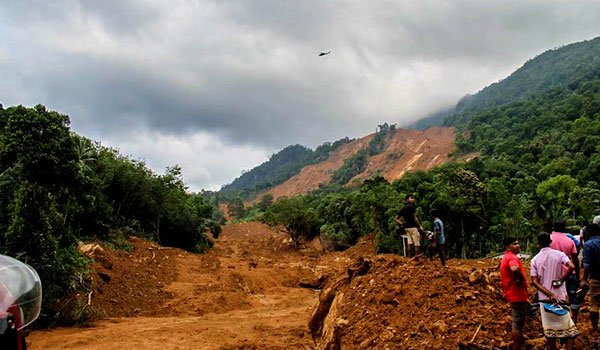For now, let us focus on those who rose to the occasion on behalf of their fellow citizens, sometimes even putting their lives in danger. They should be recognized and applauded because they demonstrated a sense of civic responsibility that is at the heart of our cultural ethos, a quality we have seen on numerous occasions of natural disaster, especially in the aftermath of the tsunami in 2004. They stepped in without a thought for self-preservation and certainly with no notion whatsoever of subsequent recognition or reward – all the more reason that they should not be forgotten or that such efforts are taken for granted.
Let me begin by saluting the late Eranga Vikumsiri, Development Officer of Eligipitiya. We do not know if his message to a superior officer, A.M Faizal, Divisional Secretary, Aranayaka, would ever be included in a compilation of famous last words or if compilers of such texts would even hear about him, but they warrant mention.
"Sir, I can see the landslide in Eligipitiya colony. The villagers informed me. I am not witnessing this serious situation. My brother is helping me evacuate the villagers. Please hurry and send ambulances."
His efforts as well as those of his brother helped save 80 people. He perished along with his brother. Eranga’s body was never found.
Was he answering a call of duty or was he going beyond the call of duty? The truth is that whatever we call it, it was an act of utmost selflessness and heroism. In fighting unforgiving elements to save the lives of fellow citizens, Eranga Vikumsiri set a standard not just for state officials but for the general citizenry. He deserves unreserved praise.
Vikumsiri was not the only state official involved in relief work. I am sure that in addition to the relevant line ministries and institutions there would have been innumerable men and women in the public sector who directly or indirectly assisted relief efforts. They all deserve praise.
There are of course many others who braved the rains and disregarded the risks to help out fellow creatures in distress. Thousands upon thousands helped in numerous ways. People called for relief, collected and delivered relief items, provided shelter, cleared debris, asked relevant questions about early warning systems, mechanisms to mitigate disaster and procedures to ensure that there is minimal damage to people and property. It was reported that a man from Turkey, a country that has had its own share of natural disasters, had been amazed by the response to the tragedy from the general public. He had seen lots of people buying water and dry rations in supermarkets, all to be sent to people who had been displaced. It was unthinkable in Turkey, he observed. So there are lots of unsung heroes. They all deserve praise.
We cannot and should not devalue the good work of these individuals and institutions and we must of course emphasize the spirit of sacrifice demonstrated by that exceptional citizen and official Eranga Vikumsiri. However, we must also recognize that there are others who spared no thoughts for self or preservation. I am speaking here of the security forces involved in search, rescue and delivery of relief. They made a monumental difference, working tirelessly around the clock with absolutely no fanfare — not even the harmless indulgence of a Selfie:
It was reported that we almost lost two Army units involved in search and rescue operations in the Aranayaka area. There was no telling of how the ground they were forced to walk on would behave. Every step could have been the last one they took on this earth. And yet, they stuck to their task, braving the terrible weather and disregarding the immense threat to their lives.
Clearly, they were disciplined. Clearly, they were as empowered by the regimen to follow orders as they were inspired by the best ethics relating to civic behavior. Indeed, we have seen the security forces raise their hands whenever the nation is facing a crisis of this kind. Rarely, if at all, are these efforts acknowledged leave alone praised. Heroism is not only something that happens in a battlefield, but the off-field work of these men and women are seldom noticed.
It is as though the security forces are the A-Z of all the back-up plans of all state entities. They are like the unofficial national insurer. "Serve them all, big or small" - isn’t that what they’ve done and what they do? The difference is that they don’t advertise. They don’t say what they can do and they don’t say ‘we did it,’ after doing it.
This does not mean that we, as beneficiaries, should take them for granted or remain silent. The government has a responsibility to correct all flaws in the state apparatus that necessitated the deployment of security forces. It cannot leave it to this ‘fall back option’ and the general good-heartedness of the people to rise to the occasion of national calamity. Whether or not all this is treated as a wake-up call by the government, however, the least we can do as citizens who saw what the security forces did and who might very well need their assistance when tragedy hits next, is to state and demonstrate our gratitude.
So here’s to every single individual who demonstrated a sense of concern to fellow creatures in distress and especially our security forces: "We are grateful and proud, and we just don’t have the words to express these sentiments in ways that reflect what we feel in our hearts."
by Krishantha Prasad Cooray






